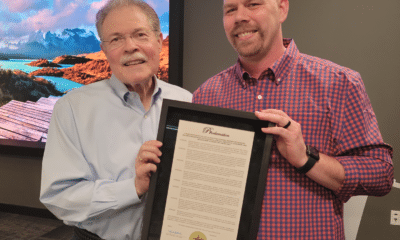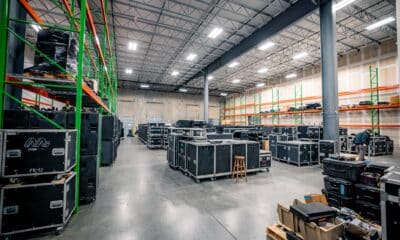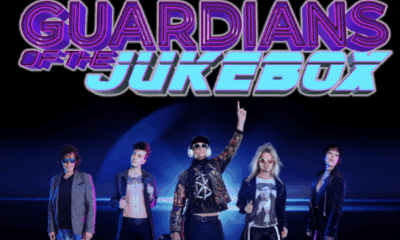Business
How to better manage post-acute care services and equipment in a changing world [Podcast]
Published
5 years agoon
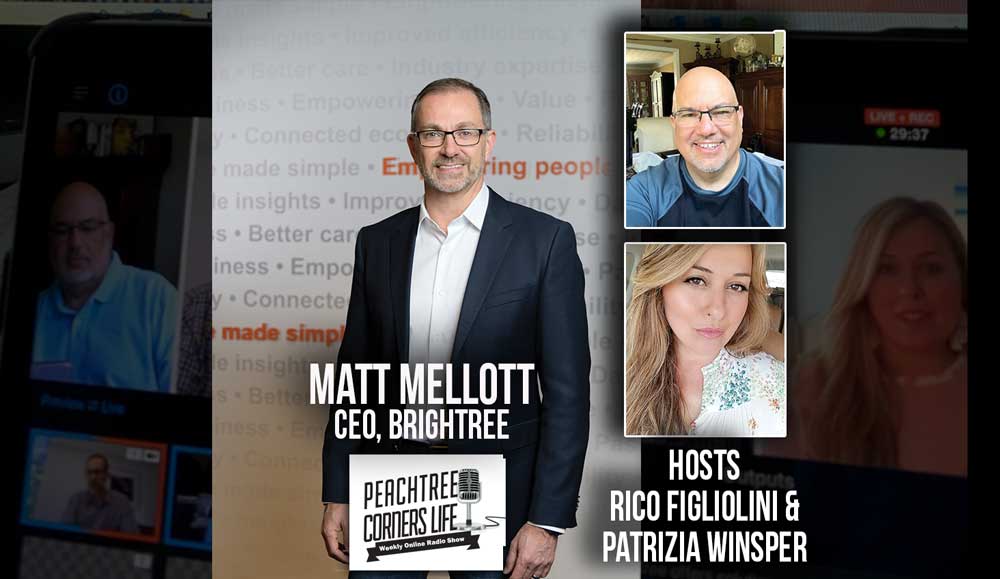
As technology continues to advance and more people are working from home, companies like Brightree are making life and at-home healthcare easier. Join Peachtree Corners Life podcast hosts Rico Figliolini and Patrizia Winsper as they sit down with Matt Mellott, CEO of Peachtree Corners based Brightree and expert on the improving technologies this company is providing healthcare workers everywhere.
Brightree is a leader in cloud-based patient management software for the out-of-hospital care industry. We provide software and services to manage patient intake, scheduling, inventory, delivery, billing, clinical, resupply, and collections to facilitate better patient care.
Timestamp:
[00:00:30] – Intro
[00:03:06] – New Offices
[00:05:14] – About Brightree
[00:09:05] – How Business has Changed
[00:11:14] – Information and Data
[00:14:20] – Types of Equipment
[00:16:52] – Client Base
[00:17:49] – Modules
[00:20:10] – Consumer App
[00:22:18] – Moving to Peachtree Corners
[00:24:27] – Keeping People Engaged
[00:31:02] – Closing
“I think we’ve all been amazed and proud of our teams who have just stepped up to the cause. I mean, the collaboration, the things we’re doing, the speed we’re doing them, has just been really incredible, you know? The exciting part for me is, that we’ve learned some things here. We’ve learned how to do things more efficiently, or maybe we don’t need to do all those steps we did in the past. So how do I capture what really came out of this? That’s a great positive. I want it to be part of our culture and our DNA going forward. So we’re having some great conversations around that right now, which is exciting.”
Matt Mellott
Podcast Transcript
Rico: [00:00:30] Hi everyone. This is Rico Figliolini host of Peachtree Corners Life podcast, one of several in a family of podcasts here in the center in Peachtree Corners. So appreciate you guys showing up whether you’re watching this live or you’re paying attention to this on demand video wise, or the audio podcast for Apple, iHeart Radio, Spotify. I appreciate you being here. Follow us. Give us some reviews. Well rise up in the search when they’re looking for us. Before we get into our guests today I want to introduce our sponsor for the show and the family of podcasts and that’s Hargray Fiber. They are our lead sponsor of the company. They provide innovative solutions to a broad range of Southeast companies. They’re a fiber optic company, but a bit more than that, they provide unique solutions to businesses, both small businesses and enterprise levels, giving bundle services and a variety of other services to be out there with these large companies and smaller ones. So they’re involved in the community. They are certainly a member of the community through the chambers and other places. I’ve seen them at high schools and such. They’re very involved. They’re not the cable guy. So when you’re looking for local support and this type of work, Hargray Fiber is the company to be with. They also provide, right now, if you want to work remotely, they provide quick collaboration tools. So check them out. HargrayFiber.com and you can call them at 1-800-613-8495. So now that I’ve done that part of it, let’s get into the show. I’m going to, Patrizia Winsper my cohost for this episode is going to introduce our guests. It’s a follow up to an article that we did two issues back by a vibrant company in Peachtree Corners. Patrizia?
Patrizia: [00:02:19] Good afternoon everyone. It’s such a pleasure to see you all again today. And the man of the hour for this podcast is our cover story for Matt Mellott, who is the CEO of Brightree. Now, Brightree was originally located in Lawrenceville, Georgia, and they recently moved their headquarters to the city of Peachtree Corners. Peachtree corners has always been known for its vibrant technology, and we’re so pleased to have Brightree join us. Matt, how are you doing?
Matt: [00:02:51] Doing well. Good to be with you today.
Patrizia: [00:02:53] Thank you. It has been a while and it actually seems like a lifetime ago since we last spoke at your offices in January.
Matt: [00:03:02] With what’s going on out there. It seems even longer, doesn’t it?
Patrizia: [00:03:06] It really does seem like decades ago, but, but Matt, let’s talk about the beautiful headquarters your company has built here in Peachtree corners. It was formerly the 1970s building. It was the Honeywell property and you stepped in, Brightree stepped in and tell us a little bit about what you did there with that property.
Matt: [00:03:30] Sure. Yeah. You know, the developer really had a vision that we bought into and you know, really probably came here based upon a rendition and a picture of what it could be. Cause as many know who live in the area, it was one of the older buildings, a bit run down and hard to envision what someone could do with that property. We’ve been thrilled with what’s
happened. Parkside, you know, is the company that did the development here. We poked pretty much a sprawling complex and kept the one three story tower. That’s all that remains in a complete renovation. I think we maintained two walls and three floors. And after that, it might as well be a brand new building and, you know, very open a bit of a, you know, a loft open feel to it, much different than the space we left. You know, it’s just, it’s been incredible. Our employees are enjoying it, having spaces they can congregate in, collaborate in. So we’re just thrilled we could make the move. Unfortunately, with the current crisis, you know, we weren’t into too long until March. We ended up having to send all employees to work from home. So I know our employees are excited to get back here when we finally can bring people back to the office.
Rico: [00:04:37] It’s a beautiful office. We were there for the grand opening and it was just, that’s a great place with a lot of open space, quite frankly. So…
Matt: [00:04:46] Absolutely
Rico: [00:04:46] You should be actually in compliance with the guidance.
Matt: [00:04:51] We’re going through that now and actually get that, that’s helping. It’s actually amazing. You know, a lot of these more open, denser, places that we’ve all moved to with development actually, unfortunately are some of the problems now when we come back in and you know, it’s sort of the old offices and high cube walls are the things that would be helpful now. But you know, we’ll get through it. Hopefully it’ll be several months and things can be pretty much back to normal here.
Patrizia: [00:05:14] Absolutely. I’m sure your employees are waiting to get back and your decorators did a wonderful job. With bright, lively colors in the common spaces and that industrial two story or three story staircase pulling up that wall. It’s just gorgeous. So Matt, let’s talk about the technology behind Brightree and what exactly Brightree does. Now I can say in a nutshell that it is software based, cloud based software sorry, that helps HME companies home medical equipment companies to run more efficiently or streamline their whole business process. Why don’t you tell us in more detail about Brightree, nuts and bolts.
Matt: [00:05:54] Sure. So we’re the most widely used solution out there for HMEs to run their business on. So, as you mentioned, we’re a cloud based software solution that HMEs, home medical equipment companies will run their, almost our entire business on. Everything from the intake they take with patient referrals, referrals from physicians, scheduling their staff, scheduling patients, logistics on trucks, trucks roll out of our customers to deliver equipment to patients in their homes. Also inventory of all that equipment. And then at the end of that process is to bill payers, Medicare, commercial payers, so our customers get paid for the services they provided. So our solution really touches all aspects of that. Pretty much our solution goes down our customers are in a lot of trouble. They need it to run their business every day.
Patrizia: [00:06:46] I have to be honest, and it’s certainly within the last few weeks, I’ve been thinking of bright tree solution and wishing we could implement it on a sort of federal level, with Cuomo mentioning, you know, the huge issue of the movement of needed much needed PPE and ventilators. And he made the very wise conclusion that hospitals could no longer in, in our day and age function as separate entities, but they all needed to somehow be connected, implement communications. And they needed to be able to move the necessary ventilators and PPE on the hospitals that didn’t need it, to those who do need it. And I wonder if a solution like that would be applicable.
Matt: [00:07:36] Sure. Yeah, probably my parent company ResMed who makes respiratory devices is playing actually a role right in the middle of what you’re describing. You know, two issues that have come up through this crisis. One, not enough ventilators. And then secondly, when the ventilators are found and purchased, are they getting to the right place? So our parent company ResMed’s, they’ve actually retooled production lines to make more ventilators and actually have been recognized in the news, a contract with FEMA. So resume is playing a key role in getting ventilators, both to the US healthcare system, but ResMed’s a global company, so they’re actually know doing this to help save lives really all over the world right now. Heavy in Europe, heavy in Asia, and then preparing for other parts of the world where we’re seeing the pandemic start to take hold. On the Brightree side, you know, our customers being the home medical equipment providers. Our customers are seeing the COVID patients as they’re discharged from the hospital. You know, they’re coming home with a variety of needs. They’re needing oxygen from an oxygen concentrator. They may need a hospital bed, and they may need a walkers and wheelchairs as they recover from, you know, having COVID and being in the hospital for sometimes many weeks. And our customers are the ones now on the front lines of that aspect of the care. And we’re helping with, whether it’s home health agencies or families, you’re helping them bring equipment into the home to care for these patients as they recover.
Rico: [00:09:05] Matt, are you finding this? Have you found that the business has changed since your company has brought in all these solutions? It’s almost like an on demand, right? Someone’s leaving. You gotta have the equipment there. Everything’s all specked out on schedule. Do you see any innovations that have come along the way since you guys started doing this since your company’s been there?
Matt: [00:09:28] Yes. I’ll speak specifically in this crisis. We’re seeing, you know, probably everyone’s heard very broadly, telemedicine really taken off through this, you know, meeting with physicians and doing a telemedicine visit. So imagine now we’re, we’re seeing the same thing where equipment needs to be put into the home. Our customers, they’re being very careful with their staff. They’d like to avoid going in the home if possible. We’ve seen things like knowing the patient’s about ready to be discharged from the hospital. Our customers have requested, let us get in and out of the home before the patient comes home. Patient might still have active COVID-19. So the people who really have had a hard time getting a lot of personal protective equipment have been home medical equipment companies because the acute systems fighting for them, the nurses and all that. So the home medical equipment companies
are sort of at the bottom of the rung of getting the necessary equipment to care for these patients. So when that happens, getting in and out of the home prior to the patient getting home is key. The other thing we’re seeing happen is that they can do remote training for patients on some of this equipment. So they’re using telemedicine now in different solutions to help the patient get set up, train them, interact with the patient and their family. So I, it’s been interesting and I think, I hope medical equipment industry will see what the position industry is seeing. A lot of this technology is probably here to stay. The efficiencies of doing this are being realized and a lot of our customers are saying, we’re not going to just turn this off when this crisis is over. This really is a better way to care for patients and much more efficient. So as you can imagine, we’re a software company. We need to now work with them on those solutions. That might be done during a crisis, but there are the beginnings of what long term will be some of the solutions that we’ll have probably going into the next year and a half.
Rico: [00:11:14] Let me ask you something, because you are a software company, because it’s like, it’s almost like an IT company in a way, right? Because you’re, you’re managing all this information, right?
Matt: [00:11:23] Right.
Rico: [00:11:23] Does the information that you gathering, is that making it more efficient? Is that also helping you tweak your software to be able to address the, the demands and the challenges out there?
Matt: [00:11:33] Oh, it absolutely is. So we have an analytic slate for that we built out over the last two years that really sits on top of our platform that helps us for internal purposes, analyze utilization of certain modules or parts of the system. Because you get to kind of touched on this, through this crisis we know there’s parts of our systems that utilized, very robustly can help customers through some of the challenges they’re having. So we can help on that aspect of you really should be using the resupply, you know, for medical supplies or other portions of our system. In addition, our, we have a very rich analytics tool for our customers. We’ve created a free version of that that we rolled out for all of our customers, giving them a quick dashboard. Packing their revenue, their cash payments, sort of also to monitor the productivity of their staff. Because as you can imagine, our customers sent all their administrative folks home as well. So the manager is no longer in the room with their employees, so they now have people all over, they’re trying to say, are they efficient? Have they processed enough orders? So we’re getting analytics to help them manage that through this time.
Rico: [00:12:41] Isn’t that funny how, how the world is with computers in a room, you’re even, like you said before, with the cubicle, you can either be there, it could be somewhere else. It almost, doesn’t matter. You’re still in front of that computer right? So, I mean, measuring that efficiency is important and probably will actually not only save money for the company, but maybe reposition some of those employees in a different way.
Matt: [00:13:04] A hundred percent agree. And with our software being cloud based, that really was a plus for our customers. They literally could tell people on Thursday, pack up, go home Friday, they have an internet connection at home. They’re up and they can be seeing, you know, they’re logged into the system and seeing their cues and the work they need to do. We’re feeling it internally as Brightree as a company, and I think our customers are that, there’s probably a whole new view on work from home when this is said and done, knowing that we all made the transition. We survived, and actually in many cases as productive as we work. So I think we’ll see our customers will, that will put some demands on us to support them in that endeavor, to let more work from home. And as a business for Brightree, I think we’re going to have a much more liberal view of working from home in the future.
Patrizia: [00:13:50] Well, the circumstances are certainly unfortunate, but I’m certainly glad that you’re able and you have the capacity to do what you have been doing. And you know, today it’s the Coronavirus, and tomorrow it might be, who knows what? So, I don’t think we’re ever going to be really in the clear from whatever new virus comes out and hits the world.
Matt: [00:14:13] We’ll probably be in a whole different place of preparedness next time after, you know, hopefully we, we learned from this one and we have everything in place if this were to happen again.
Patrizia: [00:14:20] Matt, let’s dial it down just a little bit for our listeners and our viewers who aren’t even really sure about the home medical equipment that is available for being to people’s homes. Let’s talk about what types of equipment you, your clients are taking to people in their homes after a hospital stay, after a surgery, even after COVID treatment, like you just mentioned.
Matt: [00:14:43] Sure. Yeah. I’ll first cover the broad range of products provided by our customers. It starts at one end of the spectrum of the medical companies that are focused on medical supplies. This could be wound care, ostomies supplies, incontinent supplies, diabetic supplies. So we have customers are a hundred percent focused on shipping those products into the patient’s home. Then you start moving into the delivery of equipment or equipment patients might come into a retail site and pick up and take home talking about oxygen concentrators, oxygen tanks, C-PAP equipment, C-PAP supplies, walkers, wheelchairs, bedside commodes, hospital beds. And then the range goes into the complexity of power mobility. So you’ve probably seen, you know, the power wheelchairs that have all the equipment needed for folks with special needs. You know, that could be a very expensive, complicated piece of equipment. So that also falls into what some of our customers do as well. So a patient discharged from a hospital, coming out of a COVID experience in the hospital could use a variety of that equipment I just mentioned. That needs to be taken into the home needs to be assessed, you know, to make sure if there’s training involved and the patient can’t receive that training, is there a caregiver or relative? So really assessing that the home environments even conducive to the equipment that’s being taken into that home. And then the ongoing therapy or adherence to that therapy if they need to be using the device every day on that, making sure that the patient’s
using it, and a lot of times there’s a lot of data coming from those devices that our customers can monitor that and they know when to, you’ll go to the home or call the patient that if there’s an intervention necessary.
Patrizia: [00:16:25] I also recall you mentioning medical experts or people who help with rehabilitation professionals are coming to visit the home as well as the equipment.
Matt: [00:16:38] That’s correct. So, respiratory therapists in particular with a lot of this respiratory equipment and also related in the COVID patients as well, will be ones who will care for the patient in the home and assess how they’re doing on that equipment.
Patrizia: [00:16:52] And your client base is interesting. You have everything from the small mom and pop HME companies to large companies with a coast to coast presence. Tell us a little bit about your client base.
Matt: [00:17:05] Sure. No, I think you’ve covered it. Brightree really got its start from helping the small mom and pop home medical equipment company and then it’s just grown over years as the product has more features and functionality to the point now, as we’ve talked before, two of the national HME companies utilize Brightree you know, for running their operations. Just as you can imagine, very different needs from a, you know, a large national coast to coast company than one who has two or three users on our system. So definitely, you know, makes managing and also making sure the right features for the right customer there as a complexity to it. But, you know, we’re, we’re thrilled that, you know, that much of the industry can really find use and value in our system.
Patrizia: [00:17:49] To be able to serve such a diverse base of companies you have come up with modules to actually, address the specific needs of a certain company. So why don’t you tell us a little bit about your module?
Matt: [00:18:02] Sure, sure. So Brightree as its core component, if you will, that can take the intake of patients, manage inventory and get those out the door. But we have a variety of modules that customers can pick and choose if they need one for example, being for those who sell over in the medical supply business. If you do a lot of diabetic supplies or incontinent supplies, we have a special module that does the automated phone call to a patient and a patient can order by responding to that phone call. We have solutions that are just for C-PAP resupply that call centers can use to call patients and help them with their resupply needs. We have another module that our folks who, customers who run trucks can use, helps them with logistics on route planning and also helps them with a paperless interaction with customers. you know. So no paper, they can come back and just, you know, the files are automatically uploaded into the system. In addition, we also have a variety of services we offer our customers as well. Some have outsourced their billing to our revenue cycle management services, and then we also have, call center services. So some customers can outsource their call center for a medical supply replacement. We can help them with that as well.
Rico: [00:19:15] Are there any areas that you’re planning to add into this as well that you’re looking forward to?
Matt: [00:19:20] At the moment we also have a rather rich ecosystem where if we say don’t build it or buy it from a module standpoint, we look for folks that might be best in class in the industry, and we will work with them on an integration. Since Brightree is, you know over 50% of the market is using Brightree. That’s an attractive proposition to someone who comes to the home medical equipment industry and says, Hey, I have a great solution. So we’re looking at those out there. We recently did one with a company that does nothing but focus on equipment repair, which has actually been a very manual process for our customers. They’re doing an integration with a company like that. Don’t own it, it’s just a partner relationship. We allow our customers to live within Brightree, get access to other modules and features and services by just linking them up to the Brightree ecosystem through an integration.
Rico: [00:20:10] That’s an excellent value added. You know, you know what I’m also thinking that an app would be a great thing as well for those individuals that are receiving this stuff to be able to track it themselves. The consumer facing app that would be able to like look at the equipment coming to them and stuff.
Matt: [00:20:26] So about a year ago, we actually released that the trade show for home medical equipment are App, patient engagement app called Patient Hub. What it is, it’s a Brightree generated app, but when our customers use it, you know, it’s basically personalized and their logos go onto it. The patient can do direct, secure messaging with their provider. They can do appointment checks, they can pay a bill, they can order supplies. So yeah, it’s funny you do mention that we’ve seen an uptick in the interest and the adoption of that feature through this because of the inability to really interact face to face with customers.
Patrizia: [00:21:05] They really thought of everything, Rico haven’t they?
Matt: [00:21:12] We’ve been doing this for a long time.
Patrizia: [00:21:14] America needs you. When I last spoke with you, Matt, you had just publicly launched analytics. How has that worked out for you? I understand that it was adding functionality and access to data for your customers. How has that been working?
Matt: [00:21:32] It’s gone very well. And I, you know, customers who have bought that module or that solution are really getting all kinds of new insights into their own data. And we provide benchmarking as well, so they can compare how they’re doing to others in the industry. And as well, as I mentioned earlier on, we created sort of a scaled down version of that, that we’ve rolled out to customers for free during this crisis saying, just please use this solution. You’ll find tremendous value in monitoring your business and how it’s doing. So, to be quite honest with you, the web, once we get to the other side of this crisis, I’m expecting quite a bit of interest or
along, it’s already happening along the way of, you know, could they look at the full blown solution? You know, even before we get to the end of this.
Patrizia: [00:22:16] Fantastic.
Rico: [00:22:18] What about the challenges? You know, obviously let’s, let’s take it a little broader now. You’re centered in Peachtree corners. You guys moved from Lawrenceville. What other reasons also are, not that a major reason, but employees, right? They have to come from somewhere. Sometimes it’s easier to pull them up from Atlanta this way or from Alpharetta. It’s a little closer than Lawrenceville. Of course. You live in Peachtree Corners, I think?
Matt: [00:22:43] I do, yes.
Rico: [00:22:44] That’s even better. But, so how, has it been the challenges? I’m sure all the businesses that might be listening to this other business owners would like to know the challenges you’re facing with teleworking, putting your people out to the, we touched on it a little before, but maybe we get a little bit more into that.
Matt: [00:23:04] Sure. And this started for us when we made the move. As you can imagine, when you move anywhere, in no traffic probably 25 minutes from Lawrenceville, where our old office was. And as you could imagine, people have moved to the other side of the office further out into, you know, Grayson and areas like that. So when we moved, we put a commute or a transportation burden on many of our employees who lived even, even further out. So at that time to you know make sure that everyone was excited about the move. We actually started adopting a rather a more liberal work from home policy than we had before. So in a way, it was a bit of a dry run for what happened in March when we had to turn that on for 550 employees, 150 of which were here in Peachtree Corners. So recommendations for an office move, if you know that being, the question is the ability to be flexible with the workforce. You know so that we don’t lose people just for the sake of, I’ve added 25 minutes to their drive. You know, we really were able to do things to allow them to work from home, be in the office during certain hours where teams do need to meet, you know, discuss what they’re doing, in software development, for example. But it gives them a lot of freedom outside of that. I think when this is over, we’ll find many other departments who would say they didn’t think that would work for them. They found it’s working for them. So I think we’re going to have some very interesting dialogue when we get back together on how we do this longterm.
Rico: [00:24:27] How are you keeping, how are you, how are you keeping them engaged and excited about what they’re doing? I mean, zooming all day long could be, could be a problem with some people, but we’ll keep…
Patrizia: [00:24:43] You in the studio right now in Atlanta Tech Park, but you know, we’re social distancing and doing the right thing for our well-being. So, yeah. Good question, Rico.
Matt: [00:24:52] Yeah. I am, I’m sure many people are in the boat I’m in. It’s back to back zooms all day. And that has its challenges. You find if you don’t schedule time for lunch, you know, you’re not eating it or you’re eating it on a zoom, which isn’t ideal. So you got to just think through the small things. But what we’ve done though, to connect with the employees during this time, you know, your question is, we do town halls quarterly, you know, where it’s an all employee and we get on and we do a presentation. We’ve gone to every two weeks on that. And the reason being is, you know sharing a lot of what we talked about on this call is, what’s going on with our customers? What are we doing to help our customers? What’s the impact this is having on Brightree? So we’ve just been very transparent and doing that every two weeks. And so that’s been great. We’ve gotten a lot of feedback that they appreciate that. The other thing we’ve done is we’ve got. A group out there who’s constantly surveying our employee base. So what’s the thing they want to know next? What should I answer on the next town hall? We just did one recently said, what are you thinking about when we ask you to come back to the office so we can get all the concerns from the employees. We’re hiring through this as well. And that’s a challenge. You’re hiring an employee that we’ve maybe have interviewed the hallway through. Made an offer and they’re starting and we’ve never been face to face, so those employees were keeping a real close eye on. We’re hooking them up with mentors who are not their supervisors, so they can reach out and say, you know, how do I use the solution to get on the zoom call today? Or, you know, whatever the case may be, that they’d be embarrassed to ask that they’ve got a link to the organization other than their supervisor. We’re trying to hold a virtual, I normally have a lunch with all new employees every month. We’re going to try to do that virtually here very soon. The welcome to the company, tell them about the mission of the company. And in our parent company is great at this type of collaborations. So they produce a lot of ideas and schools were able to adopt because they’re doing this with about, you’re well over 7,000 people globally have this challenge and keeping them connected. But it’s been a challenge, but we’ve learned a lot of great things to do to just keep that connection.
Rico: [00:26:55] Yeah, it has been. I’ve been talking to a few people that handle team building leadership building and how leaders should deal with their, with their employees. And it is a challenge, right? I mean, you know, there’s one company out there in Peachtree Corners, they do a Toastmasters. I think it’s kinda neat. Now they’re doing it virtually. I mean, it’s still like you’re doing this. They’ll bring things on just in a virtual environment.
Matt: [00:27:24] Right. I know departments having virtual happy hours or they have their morning coffee together and we’ve really stressed with all of our supervisors. Make sure you’ve had at least one touch point with your employees during the week. Because I mean, as we all hear the stories, you know. Working from home, sounds good at first until there’s three kids there as well. Trying to do homework and you’re maybe trying to help them with that. You have a spouse at home as well. You know, we start adding all of these things up. Work for a lot of people at home has not become the best experience and it, we’ve been very honest with our employees. We understand that. You might tell us you can’t be as productive as you maybe were in the past. And we’re in a time where that’s okay. So let’s just, you know, we keep an eye on folks and look forward to the day we can get back into the office.
Rico: [00:28:08] I think I also find people are actually working harder and longer. Sometimes it just depends on the person because they don’t have that nine to five break. And so they’re either working earlier or later and just shifting how they’re doing some of this.
Matt: [00:28:23] Right, right. But yeah, that also comes with a downside. You know, the employee, and he’s working til midnight to make up for it because the kids distracted them during the day. And that’s the employee we want to say, don’t do that. Let’s not do that, right. Let’s, your mental health, your physical health. Ours, first of all, take care of yourself and your family, but then we want to get the best of you as well. You want to make sure that they’re in the right place.
Patrizia: [00:28:45] Nice that you say all that, Matt. Especially today on May day, it’s known as the day of the worker and workers’ rights, so. Nice of you to think of your employees that way. And my, my heart certainly goes out to all the parents who are trying to do full time or have little children in the home at the same time, true.
Matt: [00:29:01] I’ve heard this story from the other CEOs I’ve spoken to. I think we’ve all been amazed and proud of our teams who have just stepped up to the cause. I mean, the collaboration, the things we’re doing, the speed we’re doing them, has just been really incredible, you know? Now the, the exciting part for me is, you know, we’ve learned some things here. We’ve learned how to do things more efficiently, or maybe we don’t need to do all those steps we did in the past. So how do I capture what really came out of this? That’s a great positive. I want to be part of our culture and our DNA going forward. So we’re having some great conversations around that right now, which is exciting.
Patrizia: [00:29:37] Well, no one could have foreseen what would happen soon after your move to Peachtree Corners, but hopefully we’ll come out the other end of this tunnel in a somewhat reasonable amount of time. Let’s talk about why you did choose Peachtree Corners, though. I know that it increased your pool of employees, right? You can now draw from Midtown or from Alpharetta, and people did have more convenient commute, but what were some of the other perks about becoming part of the Peachtree Corners community for you?
Matt: [00:30:06] Sure. You know, definitely we weren’t very close to anything with great shopping and restaurants. You know, what’s been going on and be street corners with town center was a huge plus. You know, just being welcomed into the community and being part of Tech Park and what’s going on, you know, over here, you know, in terms of that it’s been great. So I think there were a lot of just attractive features to it that the employees were really able to appreciate. And just what we were able to do with the building as well, have large areas that we could gather, an outdoor area. You know, features we just did not have in the old building, which was a, you know, a typical five story office building. And we had two floors, you know, very, very different environment here. So I think people really enjoyed the building as well as being part of Tech Park. And as well as, you know, Peachtree Corners
Rico: [00:30:51] Well we’d like to have you here and thank God you fixed that building. I can say that I’ve lived here since…
Patrizia: [00:31:02] He’s allowed. He’s absolutely allowed and we’re really, truly glad to have you as part of the community. Thank you for taking the time to speak with us today, Matt.
Matt: [00:31:12] Absolutely, appreciate it. Enjoyed spending time with you.
Rico: [00:31:15] Same here. So let’s wrap it up. We’re at our end of our time, so I do appreciate you guys being on Peachtree Corners Life. I want to say thank you again to Hargray Fiber for being our lead sponsor. And to those people that have been watching us, there’s more shows. We’ve been podcasting way more over the last few weeks, as you can imagine. So there’s a couple of other companies, CEO’s, we’ve interviewed a lot of other people that are out there in the community. Like Jay Hackett the pastor of Peachtree Corner Baptist. The head of school at Wesleyan, principal at Paul Duke high school. Lots of podcasts. Check out the YouTube page, the LivinginPeachtreeCorners.com and look for the next issue of Living in Peachtree Corners magazine at the first week of June. I think we’ll be out. Lots of good stories. So thank you guys, hang in there with us Matt, I’m going to close right now. Thank you Patrizia for being on with me.
Patrizia: [00:32:10] Thank you stay safe everyone.
Related
Business
Music Matters Productions Expands Peachtree Corners Headquarters
Published
1 day agoon
May 21, 2025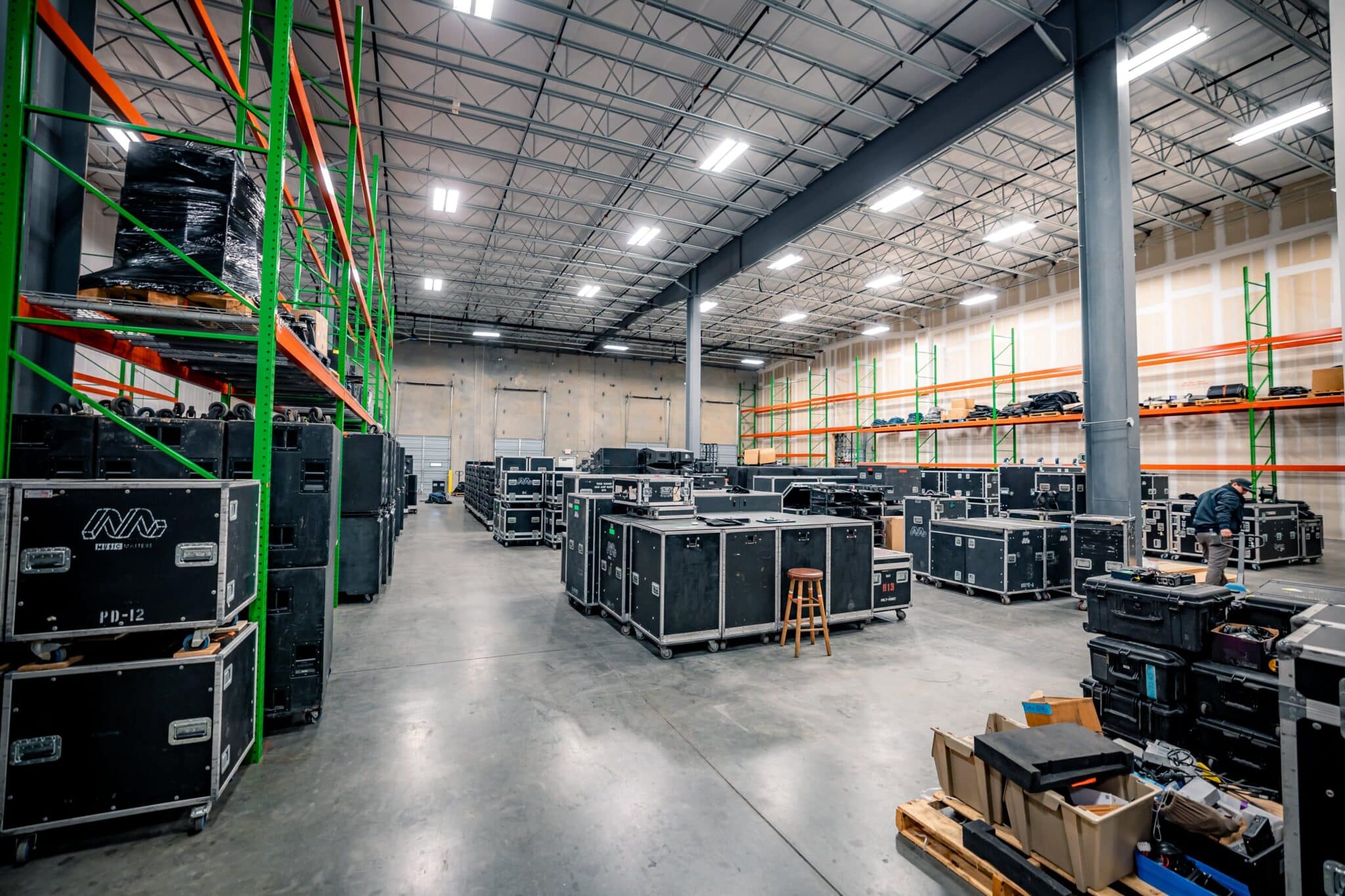
Company adds 20,000 square feet to meet growing demand
Music Matters Productions (MMP), a premier provider of audio, lighting, video, staging and rigging solutions, has expanded its metro Atlanta headquarters, increasing the total warehouse footprint from 40,000 to 60,000 square feet.
In addition, MMP has opened a second 10,000-square-foot building directly across the street to house its growing corporate production division.
The expansion comes in response to increased demand across touring, festival and corporate markets, as well as the continued growth of MMP’s high-end gear inventory. With a fully dedicated shop for each department, including audio, lighting, video, rigging and staging, the new layout provides more space for show prep, pre-rigging and crew coordination, allowing for even more efficient load-ins and streamlined execution.
New features
The rigging department now features a new mobile motor hoist test stand, allowing for in-house motor certification, a service that’s now available to external clients in the production community.
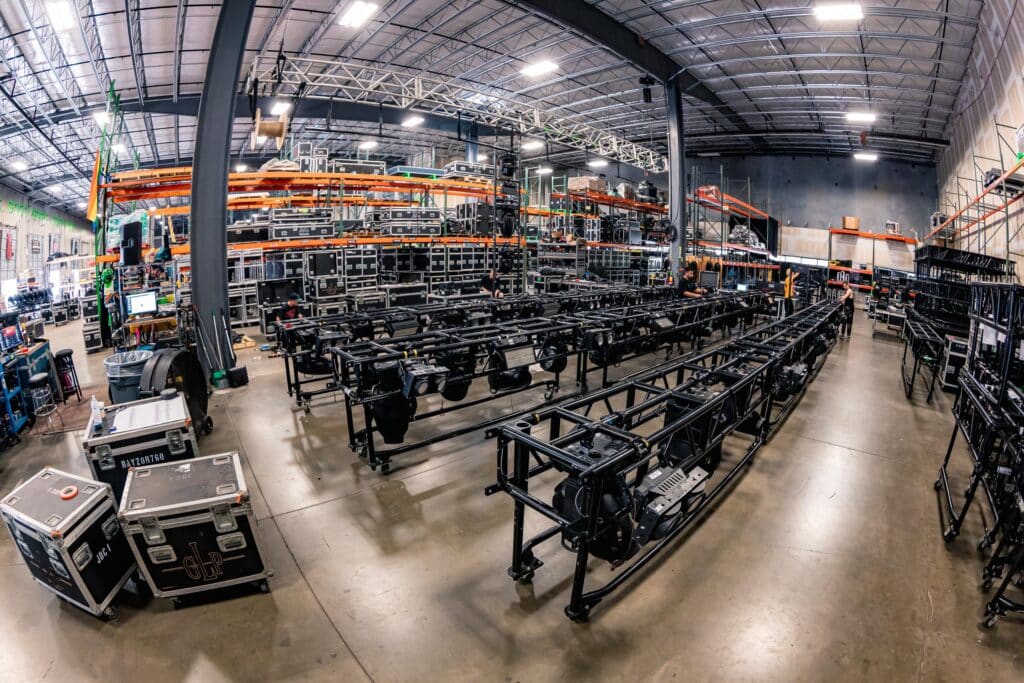
Five new truck bays were added in the process, as well, bringing the total number of bays to 17 — an important upgrade for MMP’s fleet and the increasing number of shows moving through the warehouse each week.
“This growth is a direct reflection of the work our team puts in and the trust our clients place in us,” said Aaron Soriero, owner of Music Matters Productions. “We didn’t expand for the sake of being bigger, we expanded because we needed the space to do the job right. More room means tighter prep, faster turns and better support for our clients.”
Expanding operations
The expanded warehouse and building across the street include additional offices, mixed-use areas and a dedicated repairs department, giving the team more capacity to prep, collaborate, QC and scale for increasingly complex events — both corporate and entertainment.
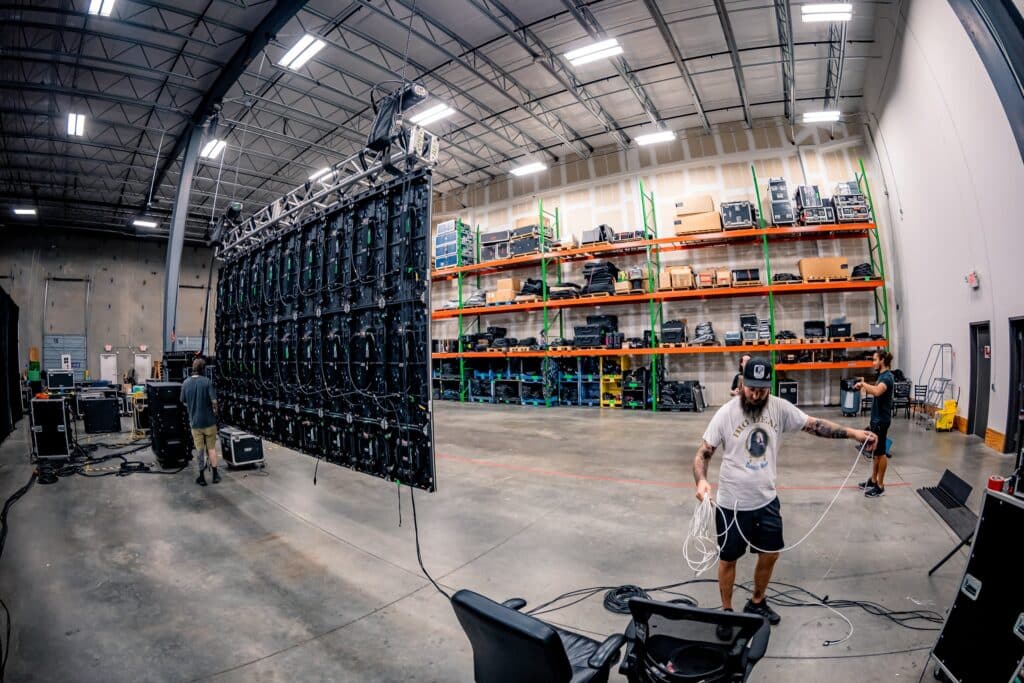
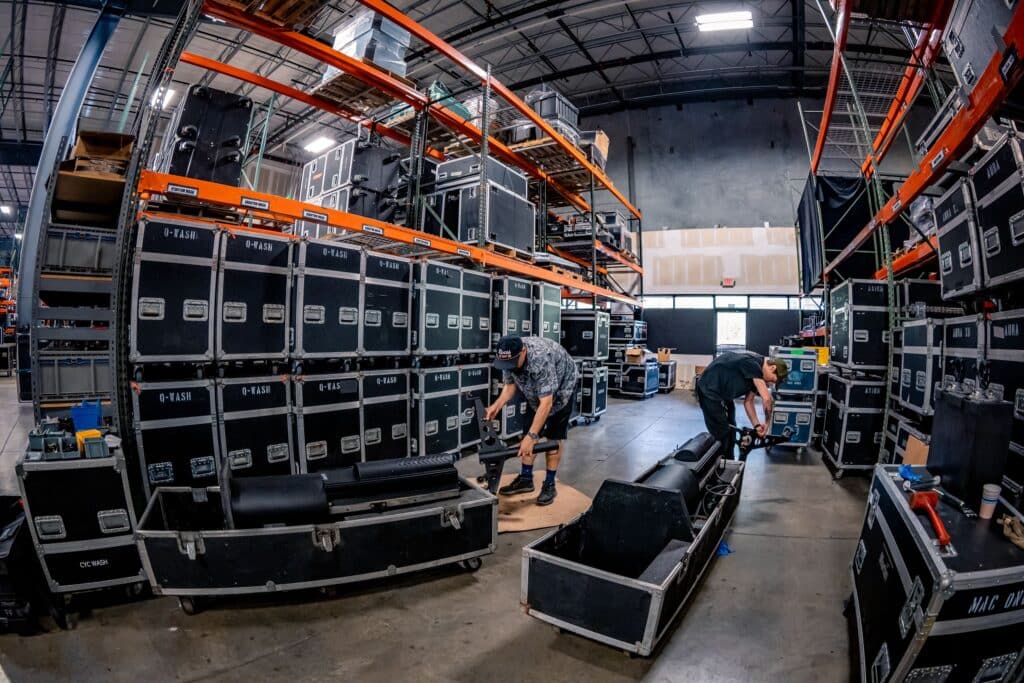
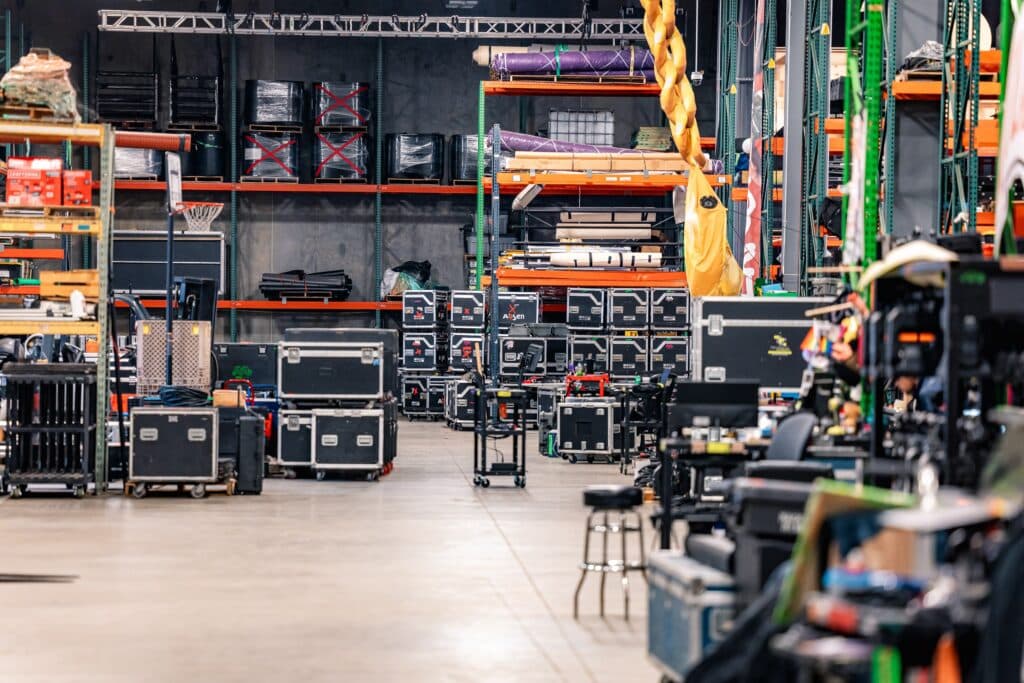
With a reputation built on reliable gear, experienced crews and an enhanced client experience, MMP continues to solidify its role as a go-to production partner for events of every size and setting — whether it’s a beachside festival, a stadium tour, brand activation or a high-stakes corporate show.
About Music Matters Productions
Music Matters Productions is a full-service live event production company based in Peachtree Corners, Georgia, providing industry-leading audio, lighting, video, rigging and staging solutions for tours, festivals, brand activations and corporate events across the country.
Known for its high-end inventory, seasoned crew and deep dedication to doing the job right, MMP supports hundreds of productions each year and is trusted by clients nationwide.
For more information, visit mmp-atl.com.
Related
Business
From Boardrooms to the Himalayas: Vandana’s Journey to Purpose and Growing with Intention [Podcast]
Published
3 days agoon
May 19, 2025
How one family blends operational clarity, conscious leadership, and community-driven values to grow their business — together.
In this episode of UrbanEbb, host Rico Figliolini chats with Vandana Aggarwal, VP of Operations at Aggarwal Real Estate, about the winding road from global consulting to family-run commercial real estate in Norcross, Georgia. With honesty, warmth and insight, V shares how she went from working 80-hour weeks in corporate strategy to rediscovering clarity in the mountains of India — ultimately helping transform her family’s business into a community-driven real estate firm managing over 50 shopping centers.
The conversation weaves together themes of leadership, legacy, operational excellence and the transformative power of both AI and yoga. It’s a story about clarity, courage and conscious growth — both in business and in life. This is another episode you won’t want to miss.
Episode Highlights
- Why Vandana left a high-powered consulting career to join her family business
- How hiking Kilimanjaro and studying yoga in the Himalayas changed her leadership mindset
- The operational overhaul she brought to Aggarwal Real Estate to support growth
- What it’s like working side-by-side with your dad, siblings, and 700+ tenants
- How the company rebranded with intention and built a mission around “building communities as a community”
- Where AI is reshaping real estate—from lease drafting to property management—and where it still can’t compete with people
- Leadership succession planning with siblings at the helm
- The importance of clarity, calm, and conscious growth in both business and life



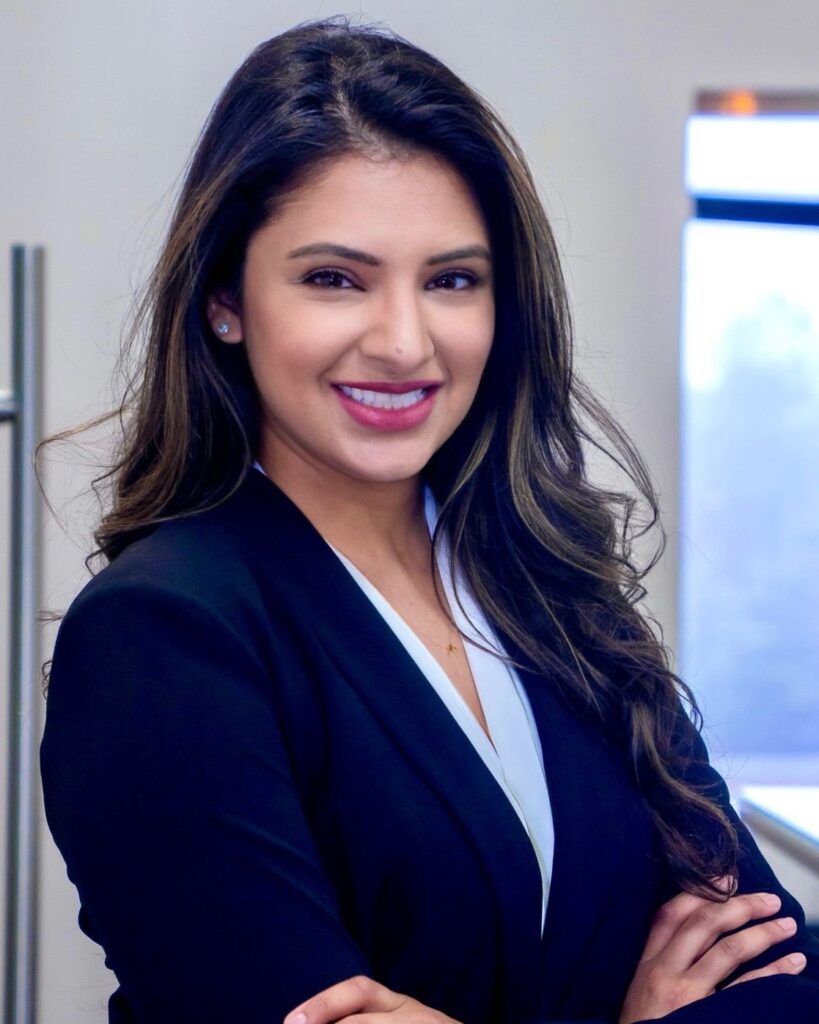




About Vandana Aggarwal
Vandana Aggarwal is the Vice President of Operations at Aggarwal Real Estate, her family’s commercial real estate investment and management firm. She brings a unique blend of strategic insight and operational excellence, shaped by her early career as a consultant at A.T. Kearney, where she advised Fortune 100 to 500 companies. A graduate of Georgia Tech, she also took a transformative detour from the corporate world to spend a year in India teaching yoga—an experience that continues to influence her leadership style today. At the core of her work is a deep commitment to family and a passion for building strong, connected communities.
Timestamp:
00:00:00 – Introduction and sponsors: Vox Pop Uli & EV Remodeling
00:03:12 – From Georgia Tech to global consulting
00:04:23 – Leading strategy for Fortune 500 companies
00:06:11 – The role of vision alignment at the C-suite
00:08:01 – Sabbatical becomes family business overhaul
00:09:35 – Bringing operational excellence to a growing real estate firm
00:12:02 – A year of yoga, nature, and healing in India
00:17:03 – Hiking Kilimanjaro, testing limits, and expanding self-trust
00:18:52 – Navigating family dynamics inside a business
00:21:56 – Planning for leadership transition: siblings, strategy, succession
00:24:06 – Rebranding the business: from American Management to Aggarwal Real Estate
00:26:33 – Where AI fits (and doesn’t) in real estate operations
00:30:04 – Legal, leasing, HR, and marketing efficiency with tech
00:31:01 – Community-focused retail and experiential shopping centers
00:32:00 – Reflections on AI, journalism, and digital trust
00:32:57 – Closing thoughts
Podcast Transcript
00:00:00 – Rico Figliolini
Hi, everyone. This is Rico Figliolini, host of UrbanEbb. This podcast comes out of the city of Peachtree Corners, and we have a special guest today. And if I don’t mess up the name, it’s Vandana Aggarwal.
00:00:15 – Vandana Aggarwal
Absolutely. You can call me V, Rico.
00:00:15 – Rico Figliolini
I’m going to call you V, trust me. And I’m Rico Figliolini, so a bit of a long name there. But V is VP of Operations of Aggarwal Real Estate here, based in Peachtree Corners? No, Norcross.
00:00:30 – Vandana Aggarwal
In Norcross, yeah. Norcross, Georgia.
00:00:32 – Rico Figliolini
Yeah, yeah. Just off 85, and?
00:00:34 – Vandana Aggarwal
Jimmy Carter.
00:00:35 – Rico Figliolini
And Jimmy Carter.
00:00:36 – Vandana Aggarwal
We’re completing each other’s sentences already.
00:00:39 – Rico Figliolini
But where are we doing this? We’re doing this from one of our great sponsors, one of our two great sponsors, Vox Pop Uli. Was this tastefully obnoxious? Let me tell you, I asked them to do a corner cut for us, and this is perfect. So they have the Moxie logo and stuff. So they’re branding, right? Same way they can brand your stuff. They’ll put your logo on anything. They’ve done, I think, 6,000 vehicle wraps. They’ve done garments, obviously. They could do one-offs or they could do 1,000. They do trade show booths, wraps, everything. So anything you need a logo on, think of what object you want it on. They’ll figure it out for you. And if you’re doing, let’s say, 5,000 mailers and you want that database customized for each postcard, they could do that also. It’s called data. I forget what it’s called, but they can do that. They can work the data into the printing as well. So all customizable. Check them out, voxpopuli.com. Now, getting to something we were talking about, hands-on stuff, which is this also. This can’t just be done by machines, right? Although machines, you still need people. But EV Remodeling Inc., they are a remodeling company. They can do design to build. They can do whole house renovation. They can create your deck, your backyard gazebo. They can put a bathroom, kitchen, anything you want. EV Remodeling Inc. is owned by Eli and his family. Lives in Peachtree Corners. It’s based out of our city. They’ve done, I think, over 250 homes recently. So check them out, evremodelinginc.com. And I want to thank both of them for being great sponsors of ours. So, it’s always a long stretch doing that, but I’m glad to have you, V.
00:02:22 – Vandana Aggarwal
I’m happy to be here. Thank you for inviting me onto your podcast. Excited to chat with you.
00:02:25 – Rico Figliolini
Yeah, no, this is cool. Well, you know, I met you, where did I meet you at? I think it was the chamber.
00:02:30 – Vandana Aggarwal
Yeah, the Southwest Gwinnett Chamber event.
00:02:32 – Rico Figliolini
Yeah, and we were talking a bit, and I was like, damn, you know, I had my father owned a business, and he wanted his kids to be in it. None of us, none of us could go into that business. It’s a little difficult, different industry. It was a hard industry, plus my father was very patriarchal, very over-demanding. God bless him. He mellowed in age. But when you were telling me about your family, I mean, your father, your mother, your sister, your brother, and you, I mean, all in it. It’s amazing.
00:02:55 – Vandana Aggarwal
We’re all together. We’re the modern-day Brady Bunch.
00:03:03 – Rico Figliolini
I love it. Yes, that’s exactly it. But, let’s start a little bit. I mean, you were telling me, I mean, you came from a consulting world. You came where you were actually being paid a lot more than you’re being paid right now, actually.
00:03:12 – Vandana Aggarwal
I told my father he couldn’t afford me when he recruited me out. So I graduated from Georgia Tech in 2007. I actually did join his company right out of college for two years, learned a lot about the company. He actually had me go through a rotation in every department of the company to learn more about what we did, how we operated. And I think very quickly, it was also 2008-9 with a recession. But I was also very interested to learn how big companies operate. How can you take a small company at that time? We were much smaller than we are today and really understand how do you go from this, which is where everyone starts, right? As a new company to get to be one of the largest in the nation, in the world and see how they operate, how they grew it from, you know, a mom and pop business to this global enterprise. Consulting was a natural transition to learn about multiple companies, multiple industries. So transitioned into AT Kearney, which has now been rebranded as Kearney, and out of their Chicago office. So I was there for seven to eight years, almost eight years.
00:04:23 – Rico Figliolini
Entry-level position you got in?
00:04:24 – Vandana Aggarwal
Yeah, I went in as an analyst. The good thing with that experience was by the time I left, I was a senior manager with Kearney. I worked across 17 different companies in those eight years. So I got to experience how CPG companies, retail companies, transportation, IT, you name it, I’ve done it. In terms of the different types of industries I got to work with, worked with a lot of Fortune 100 to 500 companies at the C-suite level. So we were coming up with all kinds of strategy projects such as new market entries, mergers and acquisitions. A lot of what I ended up specializing in in those seven years was operational efficiency and growth strategy. So it was an amazing, I’m grateful for that learning experience, the you know the caliber of minds that you work with. You also get to experience what the C-suite looks like. How does the very top operate and then it goes from the top down right? So it is very much led at this very top leadership and you see how companies change in their culture the way they operate based on how the top is designed.
00:05:38 – Rico Figliolini
So did you see good and bad at the top?
00:05:41 – Vandana Aggarwal
Absolutely. And I’m not going to name names. But you learn a lot when you see how your CEO and your C-suite right below them, the culture they’re bringing into a company and their vision and their goals if they’re aligned, unaligned. Anyone that at the very top have different viewpoints of where the company has had it is where companies start to break apart, lose revenue, lose their you know people, which is very important.
00:06:11 – Rico Figliolini
Where did you see the pain point then? What was the common denominator I guess of those?
00:06:18 – Vandana Aggarwal
There’s no one common denominator, but if I had to kind of narrow in, it comes down to what is our five-year, ten-year trajectory? Where are we headed? As large companies grow, you’re not just in one industry. You’re not just doing retail shopping centers. You’re investing in all kinds of properties just to bring it back to our company. Similarly, a CPG company can make all kinds of products, so they have to decide what it is because you have to be concentrated on the right places. If you have a leadership team that is in alignment of what that ultimate goal is, right, then you have clear strategies and, you know, metrics you’re measuring your success against. So that was a big thing that I learned. Also just, you know, seeing how great leaders operate, right? Some of the best in the nation today, I got to be in the room with them and just to see how they lead is very important.
00:07:14 – Rico Figliolini
Did you see any family dynamics in any of those businesses?
00:07:20 – Vandana Aggarwal
No. You know, there may have been like a father-son duo, but when you’re looking at the very top, I won’t say it was like all in the family, right? You know, and it also becomes the size of a company, right? You know, when you get to an international scale, you’re not always blessed that every person in your family has the right skill set and experience to fill each role on that C-suite.
00:07:46 – Rico Figliolini
I’m just thinking Trump for some reason. Every kid has a job.
00:07:51 – Vandana Aggarwal
Every kid has a job.
00:07:52 – Vandana Aggarwal
You had the accent, right?
00:07:54 – Rico Figliolini
Pretty much, I guess. So after the C-suite or expansion, you traveled a lot too, I think, right?
00:08:01 – Vandana Aggarwal
I did, yeah. So after my seven, eight years in consulting, I was reaching 30. And Shiv, my father, came to me and he said, you know, you’re doing this for a lot of outside companies. Why don’t you help us grow and bring your expertise home? And I said, look, I’ll take a sabbatical. Let me assess the company. And after that period where I took a short sabbatical to come look at how we were operating, I said, I can give you three years. I said, you can’t afford me, but I’ll give you three years of my time. And I said, I think it’ll be the right, it was the right time in the company. We were investing very heavily. We were bringing in a lot of new square footage into the company, and we weren’t designed to manage it. So we as a company, as you know, we are the investors. We have an in-house management company, an in-house leasing company. So as we acquire new properties, our team does the management for those properties in-house. We don’t provide third-party services today. And we do the leasing in-house. But at that time, when he, you know Shiv started we had one or two and now we’re at 50 shopping centers plus and other investments that we have. And there’s a very different way you operate you know and how do you how does the CEO go from being an operator to where he’s overseeing it, but he’s not into the weeds right? So he has create a system for that to happen right? You have to have standard operating processes for your property managers, your accounting team, your marketing team.
00:09:35 – Rico Figliolini
And you quite didn’t have that before.
00:09:37 – Vandana Aggarwal
We didn’t, no. And, you know, and I think that’s why he wanted to bring me in is because my strength is operations and I love it. I love going into messy places and cleaning them up.
00:09:49 – Rico Figliolini
Is that what you did when you were a consultant?
00:09:51 – Vandana Aggarwal
A lot of what I was concentrating on at the end of my consulting career, yes. So I did a lot of operational efficiency work. So we’d go in, assess the way companies were designed. And we’d interview hundreds of team members to understand what their role is. You know, what are they responsible for? How are they delivering? What are they measuring for success? And then we’d redesign the way they did that based on, again, bottom line, what are your ultimate goals for the company?
00:10:21 – Rico Figliolini
So you had to understand that before you got to that point. And you’re not making the decisions, the C-level.
00:10:29 – Vandana Aggarwal
Present, right? And similarly even with Shiv, when I first joined, I said, look, this is how I think we need to redesign the company from a bottoms-up perspective based on ultimately our goal of growth, doubling, tripling in size over the next ten years. And I think this is where the father dynamic came in. I guess he trusted me. And he said, do it. He just said, do it. And it was beautiful because right when you’re with large companies, it’s a lot of time before you get. Those decisions made and that trust, right? And so it was great. And he said, yeah, just put it into place.
00:11:07 – Rico Figliolini
See, that’s a great dad, actually. Some dads would be like, I don’t know about that daughter or son or whatever.
00:11:16 – Vandana Aggarwal
It did take time, though, like to ultimately, he was in the operation so heavily. And, you know, until today, I’m still like, step up, step up. Like, I need you to not get into the weeds. Like I think at that time we had tenants calling him, maintenance guys calling him. Like every little and big problem would go through his cell phone. I said, you’re too smart and you’re such a good investor. This is not your skill set. You shouldn’t be managing this. You need to bring people on who are expertise in this area. And I said, you need to be focused on like the larger plan.
00:11:51 – Rico Figliolini
This way you can grow it better.
00:11:51 – Vandana Aggarwal
Which I think has been very successful over the last eight years I’ve been with him now.
00:11:57 – Rico Figliolini
So before you got to him, though, you were traveling a bit internationally as well?
00:12:02 – Vandana Aggarwal
Yeah, yeah. So this is an amazing year. I was very burnt out. By the time I left consulting, I was working 70 to 80-hour weeks, traveling Monday through Thursday, if not more than that, of the week. So I told Shiv, I was like, I’m going to take a month. I’m going to go to India, get my yoga certification. No intention to teach at the time. I just said it’d be a great one-month retreat. And I was up in the mountains like Himalayas and India in a city called Dharamshala. Beautiful place. One of my favorites in the world. And I just, I think I needed it for myself emotionally, mentally to take that break. So I turned one month into one year. I didn’t know it was going to be a year.
00:12:49 – Rico Figliolini
In that same city? In that same town?
00:12:50 – Vandana Aggarwal
Yeah, so I ended up the school that I had gotten my certification with. I asked them, I was like, do you mind if I hang around for a little while? Like very casually, I’m like, you know, I’ll pay for my room and board, but I just want to be around this group and this energy. And they said, well, if you’re going to be here, why don’t you intern? And they’re like, room and board is free if you intern. I was like, sure. You know, not thinking what it was leading to. This is like that beauty of the universe coming into play. Yeah, so I started teaching, ended up loving teaching. So then I ended up teaching the 200-hour yoga training course. And I was in Dharamshala for four months. And then I moved down to Goa, their Goa campus for another six.
00:13:30 – Rico Figliolini
Where is that? Goa?
00:13:32 – Vandana Aggarwal
Goa? It’s in southern India on their west coast. It’s a beach town. Yeah. So I had the mountains and the beach. But I’m a mountain girl. I’m a hiker. But no, it was a beautiful experience. Very different from anything I’ve done with my career, right? But I became a yoga teacher for a year.
00:13:52 – Rico Figliolini
Did that clear your head? Yoga, they say, can do that, right?
00:13:53 – Vandana Aggarwal
Yeah, it’s all the tools of yoga, right? The meditation, the breath work, really getting internal, going in, right? Just going inwards, being quiet, which we don’t have. We have a lot of noise in our life today, you know? And naturally, right? Between family life, work life, social, and then just all of the noise from everything else right? Like we’re sitting here and I can hear the cars right? So you know that difference was when I was sitting there, I could hear the ocean waves and so there’s something very healing in nature naturally. So it was the tools mixed with nature and I still think nature has a very strong healing power on us. So whenever I can, I try to get out on a mountain and by the ocean. But yeah no it was it was a beautiful experience but it did bring a level of calmness into the way I approach things. It changes your perspective of you know at the end everything’s okay. No matter what you’re going through it’s temporary you’re, and everything that’s happening to us is happening to us for the good. We don’t know it, sometimes it seems like a bad situation in the moment, but ultimately you know, universe, God, whatever you believe in is at play to bring you something better in your life. And you just have to step back to understand what is it delivering us.
00:15:19 – Rico Figliolini
I like the way you think. My wife every once in a while would say, aren’t you upset about that? I’m like, I think come tomorrow, it won’t mean anything. There’s no point in, just relax. Not everything, two days later, it’s not as important as it seemed at that moment.
00:15:37 – Vandana Aggarwal
Yeah. And it’s not just that it’s not as important. It’s also like…
00:15:41 – Rico Figliolini
In perspective?
00:15:42 – Vandana Aggarwal
It’s, what am I gaining from this? Like, what can I gain from this? Oftentimes when, you know, a lot of things happen, yeah, like you get hurt or, you know, it’s like in relationships, right? Or if you have a bad business deal, right? It’s like, hey, how am I growing, right? And I think that’s what makes life very exciting, right? Otherwise, if you’re always living on a high, is it a high?
00:16:06 – Rico Figliolini
Yes. So I’m thinking you were a consultant for seven or eight years. 80 hours a week. And all of a sudden you’re doing yoga on the mountains of India. It’s just like, it’s almost like a movie. It’s almost like…
00:16:18 – Vandana Aggarwal
Eat, pray, love?
00:16:19 – Rico Figliolini
Yes.
00:16:20 – Vandana Aggarwal
It was my eat, pray, love moment for a year.
00:16:23 – Rico Figliolini
That’s amazing.
00:16:24 – Vandana Aggarwal
No, you meet amazing people, but I think we were meant to meet everyone that we come in interaction with on a daily basis. You naturally have a connection. There’s a universe at play, and we were meant to cross paths and learn something from each other, gain something from one another, give to the other person. And I think you just have to look at life that way.
00:16:48 – Rico Figliolini
I definitely think along that way. I mean, I definitely think each of us nudges each other in a crowd a little bit. That one nudge can set you off going in a different direction. So I totally believe in that. So you joined your dad. Yes. And you’re, so actually, even before we get there, so yoga, but what other interests have you been?
00:17:03 – Vandana Aggarwal
Yeah. So, I mean, I’m an avid hiker. I’ve done recently in the last few years, I’ve climbed Kilimanjaro. I did the Machu Picchu trail. I’ve done a few 14ers out in Colorado, but I like to test myself physically. You know, just, again, it comes down to how do we find that push within us past our comfort zone? So is this a physical inability or is it a mental constraint? So to get past that mental constraint of discomfort and then really push yourself to the next level and say, I can achieve something. It’s not going to be easy. So to me, if I’m on a hike and it’s not hard, I’m like, well, was it a hike? Like it didn’t test me, but no I think, you know.
00:17:55 – Rico Figliolini
You should do the Appalachian Trail. That’s like 2000 plus miles.
00:18:03 – Vandana Aggarwal
I know. And it is, you know, it’s not just like the hiking part. It is like living out in nature and, you know, sleeping in uncomfortable conditions. Yeah. Walking in the rain. It’s cold. I think the last day of our Kilimanjaro hike, it was negative 20 degrees up in the mountain and my eyelashes were frozen and I couldn’t feel any part of my body. And, you know, and it tested my breathing. And there is that element of push yourself to the point that it’s not your ego anymore. Like if your body’s saying stop, you have to stop as well and respect your body. But yeah, to really test yourself.
00:18:38 – Rico Figliolini
To circle all that back now, you’re back home. You’re working with your father and your family. A lot of businesses grow or die because of family. If it’s a family business, right?
00:18:52 – Vandana Aggarwal
Absolutely, yeah.
00:18:53 – Rico Figliolini
So you have your highs, your lows, your, sometimes you don’t get along. Sometimes decisions are split. People get upset with each other. So you’ve been at your highs and lows physically and mentally doing other things. Has that helped you in some ways? Not that you’re having a bad time with family. Because it sounds like you all fit just fine, like the Brady Bunch.
00:19:15 – Vandana Aggarwal
Let’s keep it that way. No, I mean, there’s multiple dynamics at play. It is a family business. My father is also my boss. My siblings are also my friends and my coworkers. And it’s about no matter how hard you try, you cannot separate those relationships. There is an interplay of all of it when you spend eight to nine hours a day together. But we all have, again, a common goal for the company. And then a common goal for our personal relationship. So when we sit down, we keep in mind that we like each other and we want to keep it that way. Like very simply put, that’s first and foremost for me especially. Even when Shiv had brought me in, he said, oh, can you manage everyone? And I said, I’ll manage everyone but my brother and sister. I said, you know, like I won’t jeopardize the relationship I have with them as a sibling by being their manager. Especially because I said that’s your job like good luck. But not just that it’s you know we all have different skill sets so I said how do I manage my brother who is a genius he’s a CPA by trade you know like I can’t tell him how to run the financials of this company like he’s supposed to teach me that right? And same way I teach him that. My sister has a master’s in marketing right? She is by far the most social, likable person you’re going to meet, and she knows how to work with people. I said, she needs to teach us that. So I think we’re lucky that each of us, and this is, I think, rare, where you have three kids and each one of them has their own skill set. That, I think, helps us stay in business and we see ourselves foreseeably into the long-term future being in business together is because we each bring something very unique to the table. Ultimately we value the relationships that we have on a personal level as a family above all else right? And then you know the element of like, how does the yoga experience a hiking experience teach us. That’s, it’s not specific to anyone’s situation, I think it’s a baseline of who you become right? The foundation. Like it teaches you patience, it teaches you again, everything is temporary so let’s not get overly attached emotionally or get upset or too joyful, even like, let’s just stay neutralized on any situation because it will end. And then the next one will come up and kind of flow with the ebbs and flows of the ocean. You, you flow with everything that comes with you, comes your way at work, at home. But yeah, I mean, we do sit down as a leadership team. I, my father and my siblings and I, and we talk about, hey, we separately do the exercise. Where are we going to be in five years? What role do we play in that journey? And thankfully, all of ours are very similar in what our goals are. And then we have different skill sets that we bring. So even as we design the future of the company in a moment where my father is not at the head of the table, we’re working on that redesign work. But it’s very conscious. It’s very intentional. Again, we all step back and say, hey, look, how do we maintain, how do we solve problems? Because like, you know, we were talking about how tomorrow we may not agree on something, a big decision. What are we investing in? Come back to, you know, right now Shiv gets to make an ultimate decision because he’s the one leader at the top. Tomorrow it’s going to be three people at the top. How do you deal?
00:23:04 – Rico Figliolini
So is there an exit plan for your dad? Well, not an exit plan.
00:23:09 – Vandana Aggarwal
Not an exit plan. He already has. I think he, you know, he’s gone from, he’s the hardest working person I know. I get that from him. We’re addicted to work.
00:23:18 – Rico Figliolini
80 hours a week.
00:23:21 – Vandana Aggarwal
We love working. You know, this company is his baby. I think I’ve adopted it at this point and we all have. But, to stay mentally sharp, to stay alive, you have to keep working. You have to keep doing something. You have to be working towards something that brings you joy and purpose. And I think, you know, he stepped back to take time towards a lot of his nonprofit work, community work that he’s very much engaged with. But he’s still at the top. He’s still running, you know, his, you know, he’s, you know, not slowing down. You know, we’re constantly growing. We’re growing this year in a large scale, which is amazing, and he’s leading that charge.
00:23:59 – Rico Figliolini
How many properties do you own?
00:24:02 – Vandana Aggarwall
Today we have 50 shopping centers and then a few other assets.
00:24:06 – Rico Figliolini
Is that like 3 million square feet or something? 4 million?
00:24:10 – Vandana Aggarwal
Yeah, over 700 tenants. But, you know, when we sat down a few years ago, we rebranded. Aggarwal Real Estate didn’t exist until two years ago. It was American Management Services. And we had a rebranding effort because we said we want the company’s name and the brand to represent who we are.
00:24:33 – Rico Figliolini
I like that, by the way.
00:24:35 – Vandana Aggarwal
Yeah, it needs to mean something. And we were also proud of what our father has achieved, right? He’s given us this beautiful life that we get to help grow upon. So we said it needs to pay homage to him. So we said, let’s make it Aggarwal Real Estate, ARE. And then as we were deciding what that vision is, we’re a family. In the company, we are a family, not just the four of us, but all of our staff, our team. We don’t, you know, we don’t look at them separate from who we are. And so we said our mission as a company is building communities as a community. And it talks about, hey, in all of the real estate work we’re doing, we try to make sure all of our properties are beautiful. Our tenants are happy. They have direct access to each of us in the company. And on top of that, as a company, we are a community within ourselves because we can’t create them until we are one. So it was very intentional to who we already were, but putting it into brand terms.
00:25:37 – Rico Figliolini
It’s amazing. All that property, tenants. Can’t imagine father tech can send text messages on all their problems, if they have any.
00:25:45 – Vandana Aggarwal
He’s a brilliant man.
00:25:45 – Rico Figliolini
You could be too possessed on that stuff. We want to be cognizant of our time together.
00:25:55 – Vandana Aggarwal
Absolutely.
00:25:57 – Rico Figliolini
So the next subject really was going to be about also AI, because everyone’s talking about AI. We were talking about that before the show started, before we started recording, which was kind of funny because V was asking me if we edit anything. And I was like, no, straight through.
00:26:11 – Vandana Aggarwal
I wanted to see if I could say a few things and then have it taken out of this conversation.
00:26:13 – Rico Figliolini
Nope. Nope. Doesn’t work that way. So, but ChatGPT, AI, that’s all. I mean, you know, could I create a bot to edit this? Probably. But there’s so many things we use in our lives. And you’ve been talking about how it would affect your business. Nevermind the consulting work you did.
00:26:33 – Vandana Aggarwal
Yeah. I mean, the consulting world is, I mean, it depends on the industry, the type of work you’re doing. In real estate, I’ve put a lot of thought behind this. There’s a lot of conversations happening across every industry, every sector, whether it’s education, automotives, real estate, et cetera. Everything’s being discussed. How is that changing the future? How do we incorporate it to be more efficient, right? Be the best in the industry that we can be or operate better. And so for me it’s again comes down to that operations element that I think about like, how do I incorporate it for a company that’s a medium-sized real estate firm today as we become a large company, a bigger player in the market. And people are very important in real estate right?
00:27:17 – Rico Figliolini
Talk about editing?
00:27:20 – Vandana Aggarwal
I was telling you, we should bring them into the podcast.
00:27:27 – Rico Figliolini
We’re going to run a little longer on this.
00:27:36 – Vandana Aggarwal
But let’s take retail shopping centers. This is brick and mortar. I did a paper actually for a large mall retailer back in my consulting days on how the title of the paper was, is brick and mortar dead? And, you know, full circle, I am fully dedicated to brick and mortar, retail, office, multifamily now. But you still need people to clean up your properties, fix your maintenance issues. We were talking about roofing, plumbing, electrical. That is hands-on work. You know, today there is, it’s going to be a long time before there’s a robot that comes in to do that. There will be. I don’t know. I do not see that in 10 years to say we’ve got roofers that are robotic drones that are going to come fix my roof problems.
00:28:24 – Rico Figliolini
Zumbas, they’re going to run around the roof or something.
00:28:26 – Vandana Aggarwal
That’s actually genius. A Zumba for my roof.
00:28:31 – Rico Figliolini
Why not? Attach it to the right thing.
00:28:33 – Vandana Aggarwal
But so those are very people-oriented roles today. Technology will advance how quickly it’s done or how well it’s done. But you’ll still need someone to operate the machinery of it and everything.
00:28:49 – Rico Figliolini
Just not as many.
00:28:50 – Vandana Aggarwal
Yeah. Construction, similarly, right?
00:28:54 – Rico Figliolini
Unless you 3D print a house. I’m sorry.
00:28:56 – Vandana Aggarwal
No, it’s true. It’s true. There’s so many options. I’m thinking 10 years now. I’m not going to have a 3D printer making the metal framing for my new construction project. You know, or installing the sheetrock, it does probably speed up the process, right? There will be machinery to help with that, a lot of AI development in that way. It’s a lot at an office administrative level, right? The speed in which you’re processing invoices, the speed in which you are, you know, getting payments taken in. Today, I would say as far back as right before COVID, we were still accepting checks for money. Now it’s all online. Like we do not accept money coming into the office, or it’s very limited to what we do, right? So that’s AI, if you think about it, right? The ability to pay online.
00:29:42 – Rico Figliolini
QuickBooks Online uses AI now, you can enable it.
00:29:47 – Vandana Aggarwal
So we’ve been using it for many years. The advancement of it has been a little bit slower, and now it’s sped up. Marketing, we were just talking about how you created a flyer on ChatGPT, was it?
00:30:00 – Rico Figliolini
I won’t talk about the student that’s helping us out here and how they use AI.
00:30:04 – Vandana Aggarwal
No, AI in school, right? But yeah, it’s an AI processor for my HR roles, right? Instead of reading 100 resumes, it’s going through the system to filter them out. Whether it’s writing contracts, I won’t lie. Legal jargon is coming out of ChatGPT today. And so it’s speeding up the way we’re doing work. But my legal team probably, and they won’t say it, should be using AI if they’re not. To help create some of this work right? So it’s like these companies are still going to be needed, but the way that they’re able to respond to us at a quicker, everything would just happen faster right? From typewriters to computers, everything.
00:30:49 – Rico Figliolini
Especially if they know that they just did a lease from you for this property in Texas, that we need three more leases done for three other places, it’s not going to be that much different, right? It’s a template.
00:31:01 – Vandana Aggarwal
It’s coming out a lot faster. Yeah, I mean the negotiations, that’s a people-to-people thing right? So I think thankfully in the real estate world we’re still going to need people. We’re still going to need buildings right? The way built, we were just talking about how a retail shopping center is no longer just for shopping. It has to be for entertainment. It has to be for bringing families in and giving them more than just, hey, go into a TJ Maxx and buy something, right? It’s like, what else are you getting when you’re at that center? Whether it’s a play space or events, we’re starting to do more events at our shopping centers. So it’s, again, serving the community.
00:31:39 – Rico Figliolini
We’re seeing that more. More of that happening. We could go on and on here.
00:31:46 – Vandana Aggarwal
Chatting with you.
00:31:46 – Rico Figliolini
Yeah, and we should probably do one on either AI in the marketplace. Or maybe a panel discussion on something similar.
00:31:51 – Vandana Aggarwal
Yeah, overall, yeah. That would be exciting.
00:31:55 – Rico Figliolini
Yeah, I think that would be cool.
00:31:56 – Vandana Aggarwal
I think it’s interesting to learn about kind of where every industry is heading. It impacts all of us.
00:32:00 – Rico Figliolini
For sure. I mean, the magazine business, I mean, it’s all like we have certain, we have AI rules. But, you know, AI is still being used to degree to research things. And to do certain things like that. You know, hopefully journalism isn’t just handed over. They do say 40% of the internet is AI written. So, which is kind of incestuous almost because it’ll just feed on itself at some point.
00:32:27 – Vandana Aggarwal
There’s a whole discussion about the validity and the trust behind digital content. In the next few years. I think it’s going to diminish.
00:32:35 – Rico Figliolini
Oh, yeah. I mean, I’m seeing videos now and it’s just like, it just looks so real. And you could not tell the difference, even voice-wise.
00:32:42 – Vandana Aggarwal
And that’s scary to think. It’s like, how do you trust what you see?
00:32:47 – Rico Figliolini
So on that note, and since this is not edited, so this is right from the beginning. So this is all true. But I want to thank everyone. I want to thank you, V, for being with me.
00:32:57 – Vandana Aggarwal
Thank you so much for having me. This was a great conversation.
00:33:01 – Rico Figliolini
It went by way faster than some of these go. So this is a great discussion. Thank you, everyone. I appreciate you for joining us. Thank you for Vox Pop Uli for the studio look and for letting us do it here, for being a sponsor and for EV Remodeling. Also, I want to thank Jeremy Pruitt behind the camera who has taken care. He’s a Paul Duke student. And it wasn’t him that I was talking about before, by the way. But all the work he’s done on the back end on this. So thank you, Jeremy. So thank you all. Thanks for being with us.
Related
Business
Peachtree Corners Grows Business Opportunities Through Economic Development
Published
2 weeks agoon
May 6, 2025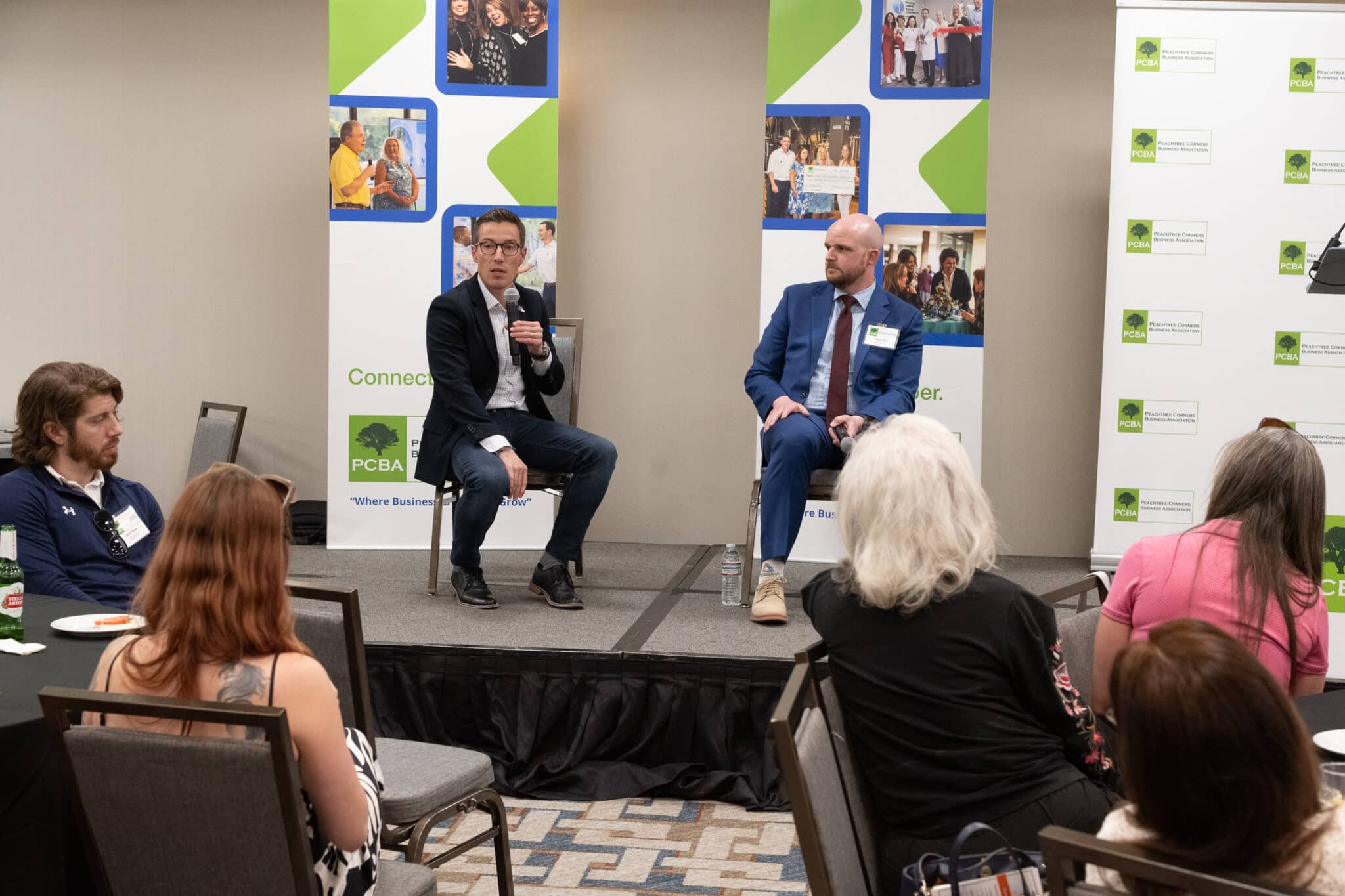
Most residents and business owners in Peachtree Corners probably think they know all about the economic development and strategic planning of Peachtree Corners, but do they really?
Peachtree Corners Business Association invited Peachtree Corners Economic Development Director Betrand Lapoire and Partnership Gwinnett Director of Economic Development Andrew Hickey to its After Hours Speaker Series on March 27 to discuss the city’s growth from a 1971 master plan to a bustling city with 42,000 inhabitants and 40,000 jobs.
Key points included the importance of business retention and expansion, with 24 projects last year creating 1,600 retained jobs, 1,600 new jobs and $250 million in new capital investment.
The Curiosity Lab, a world-class innovation center, was emphasized as a significant attraction. The city’s zoning and infrastructure plans were also discussed, focusing on balancing office and residential development to maintain a vibrant, sustainable community.
Matching jobs to residents
Although Peachtree Corners is just a teenager in terms of being an incorporated city, the foundation for this vibrant, fast-paced economic hub was laid more than 50 years ago by technology pioneer Paul Duke.
“Peachtree Corners was the first master-planned, business innovation technology park in metro Atlanta,” said Lapoire. “It was in response to the brain drain of technology with Georgia Tech graduates leaving the area.”
While the city may have a small-town feel, it’s the largest in Gwinnett County by population, but not land mass, he added.
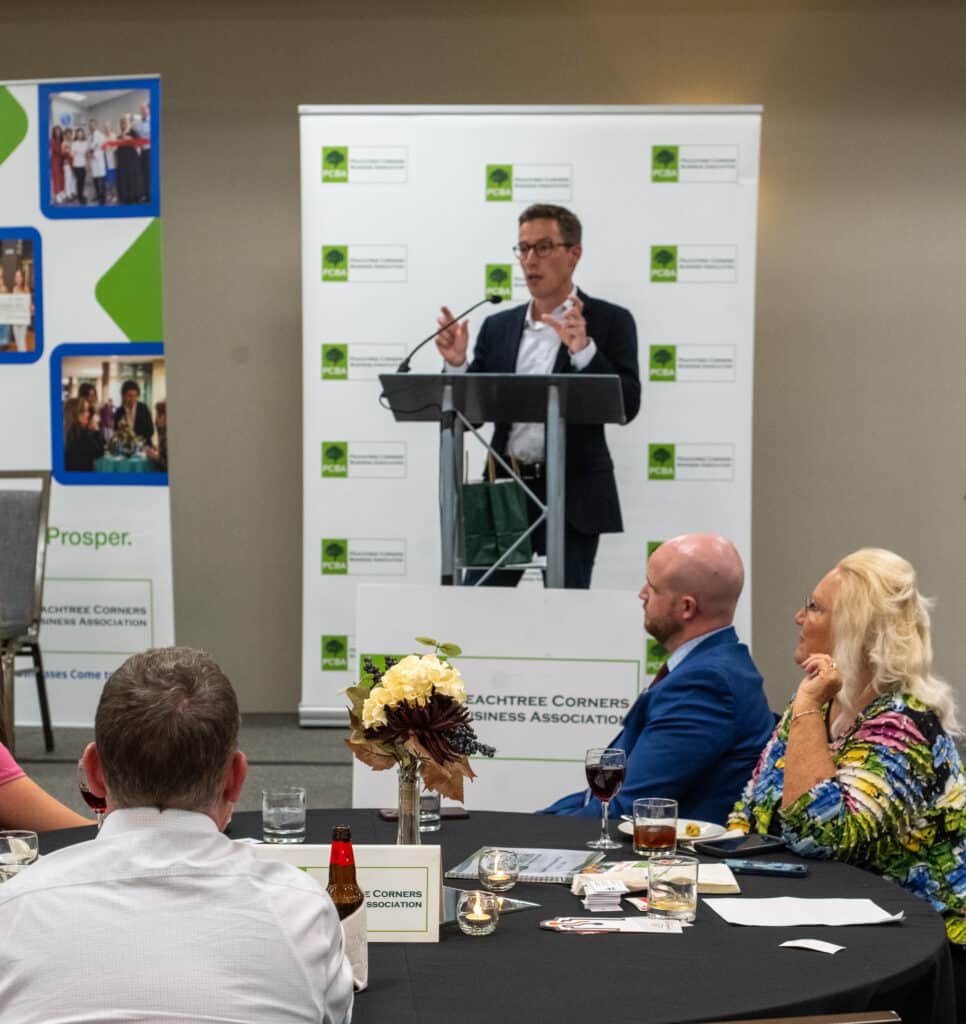
“The city started from a commercial, industrial, R&D base and then was expanded around it,” said Lapoire.
Though home to more than 42,000 residents, most of the jobs in Peachtree Corners are filled by people who live outside the city, he added.
“So we have this interesting mismatch, in a way, although not unusual,” said LaPoire. That creates traffic and transit issues. So that means that one of the solutions is to create more jobs here to fit the profile of the community.”
He presented charts that show professional services, consulting and engineering as the largest job categories. The next tier of businesses are wholesale and manufacturing.
“So we have a good mix of industry,” he said.
A five-year plan
The city has a five-year economic development plan (2023-2028) that outlines strategies for attracting and retaining businesses, with education and workforce development being key components.
Partnership Gwinnett has similar goals as Peachtree Corners, but on a larger scale.
“We are the county’s sales and marketing arm for all 17 cities now, and we receive funding from both municipal sources as well as existing businesses here — both in Gwinnett and outside of Gwinnett as well,” said Hickey.
He shared how Partnership Gwinnett is designed to drive a lot of major corporations toward doing business inside and with Gwinnett County.
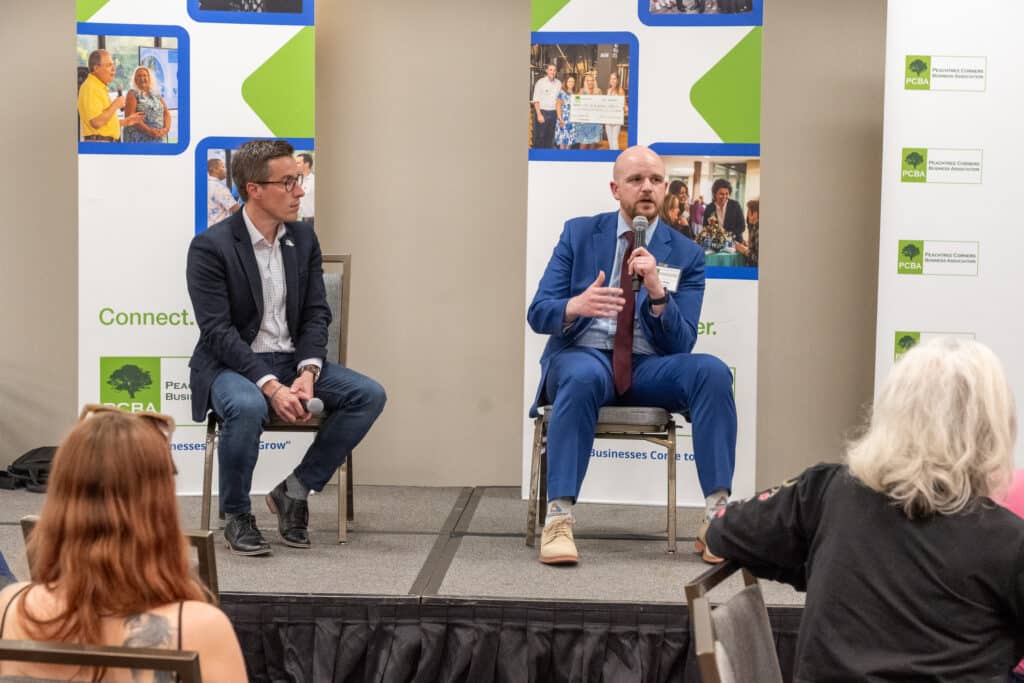
“One of the biggest things that we talk about that I’m sure it seems like most of us here, if you live here, you work here, you understand it. It’s the diversity that exists here in Gwinnett,” he said. “With a diversity index of 85, that means if we walk out of the Hilton here and we say hello to somebody, there’s an 85% chance they’re from a different ethnic or cultural background than ourselves, which to you and I may seem normal because that’s the life that we live in.”
He added that for companies, there’s a tremendous value in that, whether they have stated values, or they’re just making hiring decisions to get a wide range of candidates to fill those roles. Additionally, because of the proximity to Atlanta, Gwinnett County has a great labor draw.
Partnership Gwinnett
Partnership Gwinnett plays a significant role in recruiting businesses, expanding existing companies and developing the workforce. Hickey showed how the organization was involved with more than 24 projects last year.
“A majority of those were expansions, and that is a common thread you’ll see in economic development,” he said. “In business retention, expansion is so vital to working with our existing companies to make sure that they have the resources they need.”
He added that’s what leads to new investment and job creation in the community.
The organization also focuses on redevelopment projects, working with cities and the county to improve infrastructure and community amenities — especially strong educational institutions such Georgia Gwinnett College, Philadelphia College of Osteopathic Medicine and others.
Quality of life
In closing, both men stressed the importance of recruiting companies and developing the workforce, along with one aspect that means a lot but may not be as obvious — quality of life.
“It’s definitely evident that people like to work where they live — the whole live, work play experience,” said Hickey. “I joke that the part that people really have the most questions about, and are most excited to learn about, is new events at The Forum or Gwinnett Place Mall.”
Although they want to know what’s the next major company coming to Gwinnett, people REALLY want to know about how to spend their leisure time.
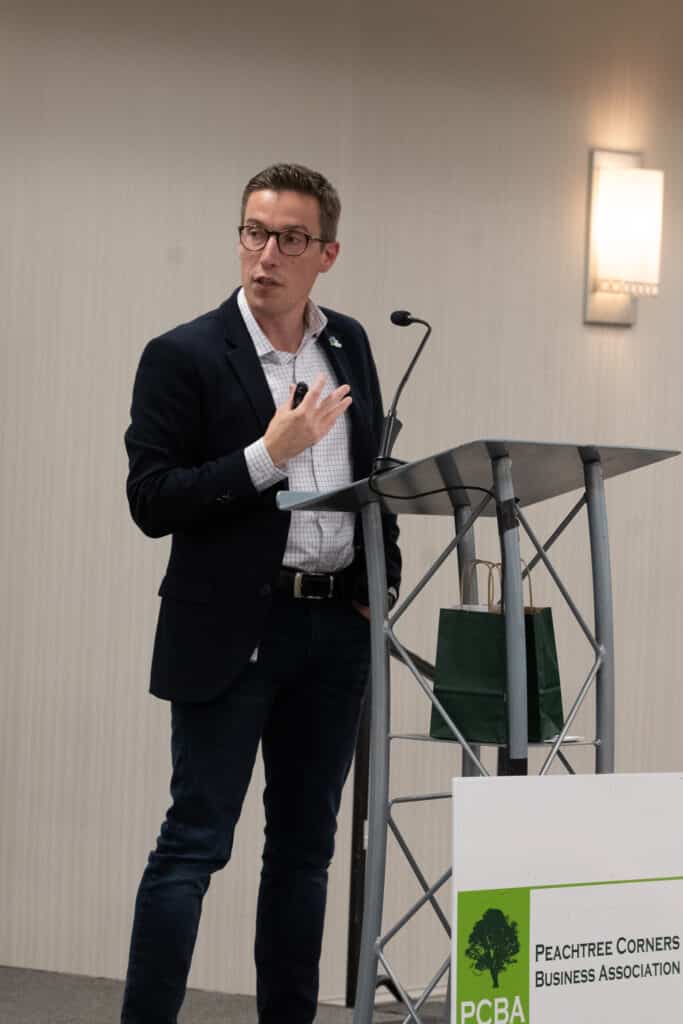
“That speaks to the importance of ensuring that we have a great community,” he said. “So at Partnership Gwinnett we work with all of our cities, and the county government as well, [on] a kind of a best-practices trip.”
He added that the peer tour allows everyone to know what the neighboring communities are doing and share the good news.
“We will take all of these elected officials, but also city staff, to different cities across the Southeast,” he said. “Last year, I believe they went to Huntsville, and have been to Greenville, Chattanooga — all cities that have done some really cool redevelopments that have taken their city to the next level. Our goal is to learn from them.”
Related
Read the Digital Edition
Subscribe
Keep Up With Peachtree Corners News
Join our mailing list to receive the latest news and updates from our team.
You have Successfully Subscribed!

Peachtree Corners Hosts Discussion About the Future of Local Policing

D1 Training Brings New Fitness Concept to Peachtree Corners

MomoCon 2025 to bring 60,000 Fans to Atlanta for a Weekend of Cosplay, Animation, Gaming and Music

Atlanta’s Dog Howl-O-Ween Festival Moving to Peachtree Corners for 2025

City of Peachtree Corners Awarded Certificate of Achievement From GFOA for Seventh Straight Year

Local Special Olympics Pickleball Team Honored with State House Resolution

From Boardrooms to the Himalayas: Vandana’s Journey to Purpose and Growing with Intention [Podcast]

Brandon Branham Honored for Transformative Leadership in Peachtree Corners

PTC Concert Series: Guardians of the Jukebox on May 31

Music Matters Productions Expands Peachtree Corners Headquarters

Brandon Branham Honored for Transformative Leadership in Peachtree Corners

From Boardrooms to the Himalayas: Vandana’s Journey to Purpose and Growing with Intention [Podcast]

MomoCon 2025 to bring 60,000 Fans to Atlanta for a Weekend of Cosplay, Animation, Gaming and Music

Local Special Olympics Pickleball Team Honored with State House Resolution

Atlanta’s Dog Howl-O-Ween Festival Moving to Peachtree Corners for 2025

D1 Training Brings New Fitness Concept to Peachtree Corners

Light up the Corners [Video]

Capitalist Sage: Business Leadership in Your Community [Podcast]

Cliff Bramble: A Culinary Adventure through Italy

Top 10 Brunch Places in Gwinnett County

A Hunger for Hospitality

THE CORNERS EPISODE 3 – BLAXICAN PART 1

Top 10 Indoor Things To Do This Winter

The ED Hour: What it takes to Remove Barriers from Education

Peachtree Corners Life
Topics and Categories
Trending
-
Business3 days ago
From Boardrooms to the Himalayas: Vandana’s Journey to Purpose and Growing with Intention [Podcast]
-
City Government2 days ago
Brandon Branham Honored for Transformative Leadership in Peachtree Corners
-
Business1 day ago
Music Matters Productions Expands Peachtree Corners Headquarters
-
Entertainment3 hours ago
PTC Concert Series: Guardians of the Jukebox on May 31







